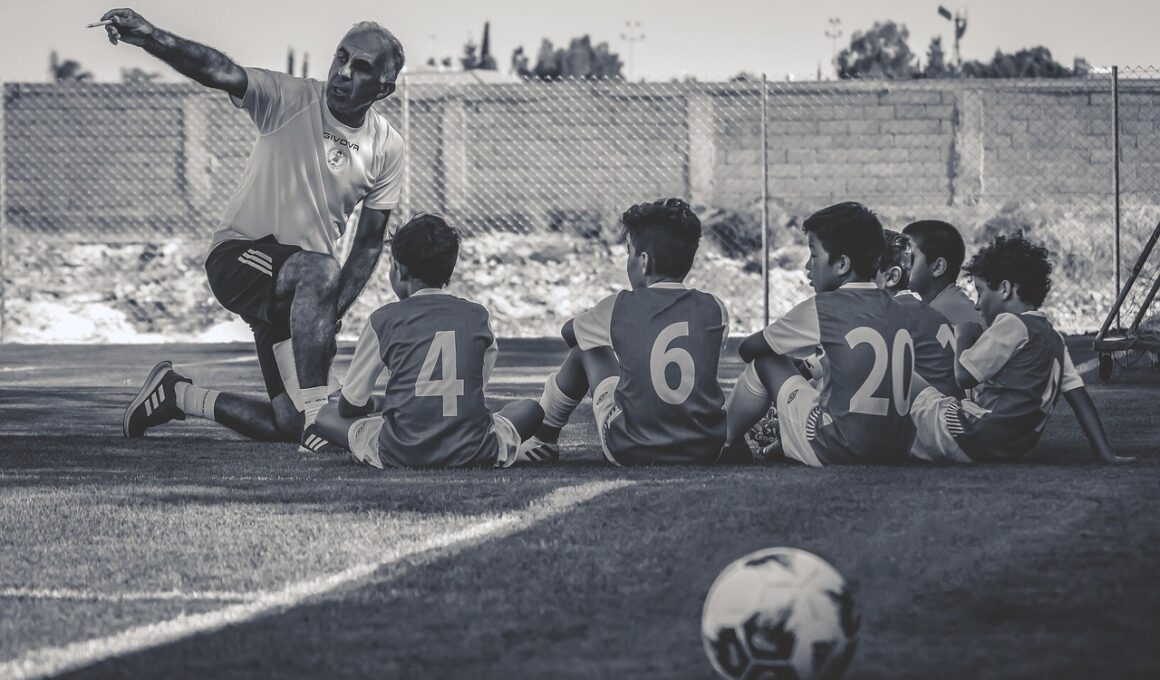Coaches’ Perspectives on Penalties and Discipline for Fair Play Violations
Coaches play a critical role in the development of young athletes, particularly when it comes to instilling principles of fair play. They are responsible for creating an environment where integrity and sportsmanship are prioritized. Coaches often find themselves in situations where they must enforce rules and regulations regarding penalties for violations of fair play. Understanding the nuances of how discipline is administered is essential in fostering a culture of respect and fairness within teams. Coaches must balance the need for discipline with the understanding that young athletes are still developing both personally and athletically. This balance requires clear communication regarding the expectations set forth and the consequences that arise from failing to meet those standards. Often, a coach’s approach to penalties can either encourage or deter future violations. Coaches should model the behavior they expect from their athletes, reinforcing the idea that penalties are not just punitive measures, but educational opportunities that teach valuable life lessons. By considering their role carefully, coaches can significantly influence their players’ commitment to fair play and ethical behavior in sports, thereby contributing positively to their overall development.
The Importance of Education in Fair Play
Effective communication about penalties is essential in ensuring that athletes understand the implications of their actions within the context of competitive sports. Coaches must provide consistent education about the rules of the game and the values that underpin fair play. This educational component helps athletes comprehend not only the importance of adhering to rules but also the rationale behind those rules. Moments of discipline can thus transform into learning opportunities for athletes, enabling them to reflect on their decisions and understand how those choices impact not only their personal experiences but also their teammates and overall game outcomes. This proactive approach can inspire athletes to take ownership of their behavior and contribute positively to the team environment. Coaches should also employ scenario-based teaching methods where athletes can analyze various situations regarding fair play and penalties. This method encourages discussion and critical thinking, allowing athletes to engage with the subject matter deeply. Additionally, fostering an atmosphere where athletes can openly discuss the challenges they face regarding discipline and integrity can enhance their commitment to upholding the values of fair play throughout their sports careers.
Reinforcement of positive behavior is essential in promoting fair play amongst athletes. Coaches are tasked with recognizing and rewarding exemplary conduct, which serves as a motivating factor for athletes. Creating a culture that celebrates good sportsmanship can have significant effects on team dynamics, leading to higher performance and satisfaction among players. Recognition can take various forms, ranging from verbal praise to formal awards presented at team events. Coaches should aim to highlight instances where athletes show respect for opponents, officials, and the rules of the game. By consistently emphasizing positive actions, coaches cultivate an environment where athletes are more likely to replicate these behaviors. Moreover, integrating discussions about role models and historical figures in sports who exemplify integrity can further inspire and guide athletes. This approach allows coaches to use relevant examples that resonate with their players, illustrating the long-term benefits of fair play in sports and personal lives alike. Coaches must not only address violations but also consciously seek to create situations that showcase and reinforce the values of fair play. This balanced methodology enhances athletes’ understanding that maintaining integrity is as essential as achieving victory.
Addressing Violations with Constructive Feedback
When violations of fair play occur, coaches must handle the situation with a degree of professionalism and empathy. It is crucial that the response to infractions includes constructive feedback rather than solely punitive measures. Coaches should encourage self-reflection among athletes, prompting them to consider the implications of their actions and how they could handle similar situations differently in the future. This reflective practice can facilitate a deeper understanding of the importance of fair play. Alongside discussing the penalties, emphasizing the reasoning involved helps athletes recognize how such actions can affect the game’s integrity and the spirit of competition. By doing so, coaches teach valuable life skills and instill the notion that mistakes can become learning moments. Feedback should always be delivered respectfully, fostering a growth mindset rather than fear of consequences. This will help strengthen the athlete-coach bond and create a safe environment wherein athletes feel comfortable discussing their challenges and uncertainties regarding ethical dilemmas. Ultimately, this approach will not only address current violations but also promote ethical decision-making in future scenarios.
Consistency in enforcing penalties is vital to maintaining trust and respect in the coach-athlete relationship. Coaches should establish clear guidelines for what constitutes a violation of fair play and communicate these expectations to their athletes at the beginning of the season. By ensuring that all athletes understand the consequences of rule violations, coaches create a predictable environment where athletes can focus on improving their skills rather than navigating unclear expectations. Such clarity can greatly diminish the chances of misunderstandings and surprises during competitions. Regular discussions around rules and the importance of fair play reinforce these principles and further enhance transparency. Coaches must also ensure that penalties are fairly and evenly applied across the board, without favoritism or additional biases. This impartial enforcement is essential in cultivating a sense of equality among players, thereby reinforcing the importance of fair play. When athletes perceive that their coach is consistent and fair in applying discipline, it builds loyalty and encourages adherence to ethical principles. This trust is fundamental in realm of sports, ensuring that all athletes remain committed to the values of fair play and sportsmanship.
Role of Coaches as Ethical Leaders
The role of coaches extends beyond teaching athletic skills; they are ethical leaders who set the tone for their team’s culture. This responsibility means they must exemplify the values they wish to instill in their athletes. Coaches are often seen as authority figures and mentors, thus their actions and decisions carry substantial weight. They are expected to navigate moral dilemmas and demonstrate integrity. Coaches must also reflect on their behavior, as athletes frequently emulate their attitudes and actions. Coaches need to consider how their understanding of ethics, discipline, and fair play can influence their athletes’ growth. Ethical leadership demands an ongoing commitment to self-improvement and learning, which is vital for coaches seeking to promote fair play within their teams. Effective coaches continuously educate themselves about ethical considerations in sports, participate in workshops, and engage with their peers to exchange ideas about best practices. They should also stay current with new developments in sports ethics and adapt their coaching strategies accordingly. This ongoing learning not only benefits the coaches themselves but ultimately translates to improved guidance for their athletes.
In conclusion, coaches play an indispensable role in promoting fair play through their perspectives on penalties and discipline. By addressing infractions thoughtfully and emphasizing education, they can create a positive culture where athletes embrace the values of sportsmanship. By balancing reinforcement of positive behaviors with constructive feedback, coaches empower athletes to grow and learn from their experiences. Consistency in enforcing rules fosters trust, while ethical leadership promotes a foundation for integrity. Coaches must recognize that their influence extends beyond the playing field and into their athletes’ lives. Therefore, the commitment to fair play must be unwavering. By nurturing a deep understanding of ethics and integrity, coaches help shape well-rounded individuals prepared to navigate both sports and life. As agents of change, coaches have the unique opportunity to inspire the next generation of athletes to not only pursue excellence but also honor the principles of fair play and respect in every situation. Ultimately, the results of their efforts can resonate throughout sports and society as a whole, establishing lasting impacts on players and teams alike.





